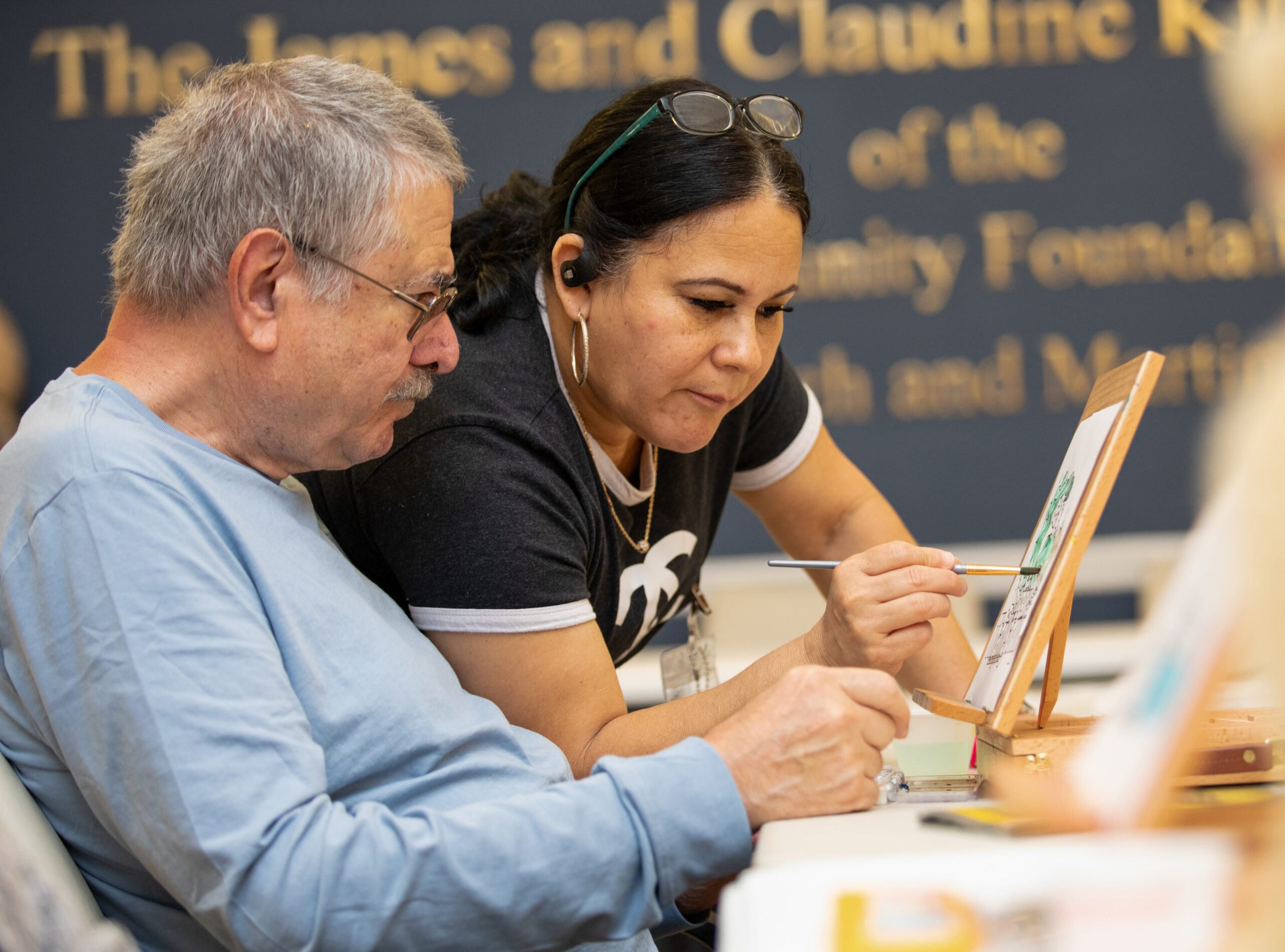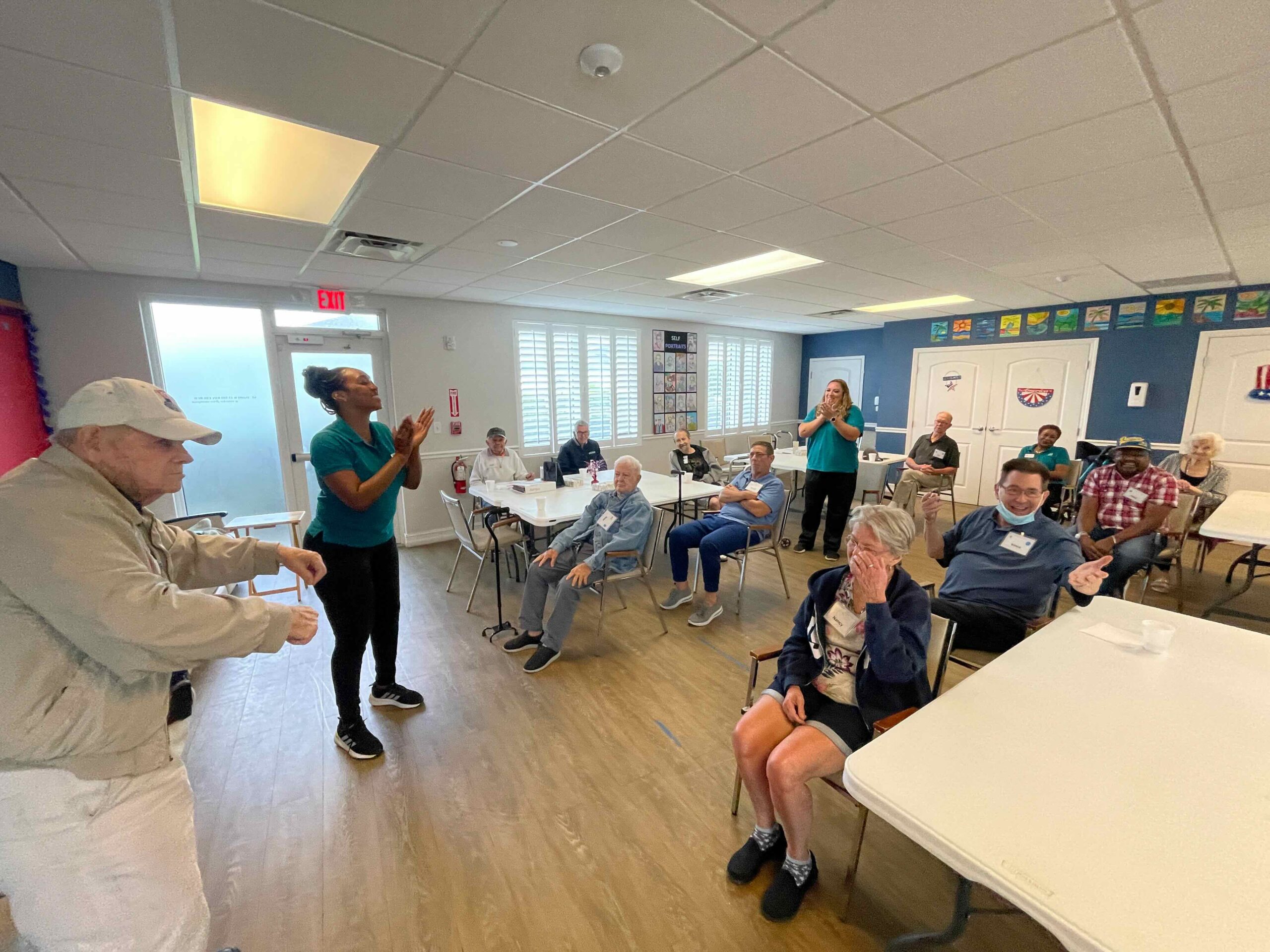
Why Healthcare Providers and Family Caregivers Should Attend the Alzheimer’s Community Care Education Conference
At Alzheimer’s Community Care (ACC), we understand the challenges that come with caring for individuals with Alzheimer’s disease and related dementias. As we continue to support families and healthcare professionals through these journeys, we know that education is one of the most powerful tools we can provide. That’s why we’re excited to host our upcoming 2025 Education Conference, happening on May 7th at the Palm Beach Gardens Marriott. Whether you’re a healthcare provider or a family caregiver, this event promises to be an invaluable opportunity for learning, networking, and growth. 
Why Should Healthcare Providers Attend?
As healthcare providers, you are on the front lines of care for individuals with Alzheimer’s disease. However, with new research, evolving caregiving strategies, and emerging technologies, it’s essential to stay updated on the latest developments in dementia care. Our Education Conference is a unique opportunity to enhance your knowledge, refine your caregiving techniques, and hear directly from experts in the field.
You’ll have the chance to attend a variety of sessions tailored to healthcare professionals, focusing on best practices, innovative therapies, and the latest research in dementia care. Additionally, the conference will offer valuable insights into the emotional and psychological aspects of caregiving—an area that is often overlooked but critical for maintaining the well-being of both patients and providers.
By attending, healthcare professionals can earn five continuing education credits.
Why Should Family Caregivers Attend?
For family caregivers, the journey of caring for a loved one with Alzheimer’s can feel overwhelming. You’re not alone. At the Education Conference, you’ll be surrounded by others who understand your experience, and you’ll have access to a wealth of knowledge designed to make caregiving a little easier.
Our sessions for family caregivers will cover a wide range of topics—from managing difficult behaviors to understanding the emotional toll that caregiving can take. You’ll also hear from leading experts who can help you navigate complex decisions, connect you with support resources, and equip you with strategies for self-care, which is vital for your own health and well-being.
Additionally, the conference offers an excellent opportunity to meet and connect with other caregivers who are facing similar challenges. The support network you build here can be just as valuable as the information you receive.
What to Expect at the Conference
This year’s conference will feature engaging keynote speakers and a variety of breakout sessions designed to address the unique needs of both healthcare providers and family caregivers. You’ll leave the event with practical strategies, new insights, and a renewed sense of purpose and support in your caregiving journey.
In addition to the educational content, attendees will have the chance to visit vendor booths showcasing the latest products and services designed to assist with dementia care, providing you with resources to improve the quality of life for both caregivers and patients alike.
A Call to Action
Whether you’re a healthcare provider looking to enhance your clinical practice, or a family caregiver seeking advice and support, ACC’s Education Conference is an event you won’t want to miss. We’ve designed this conference to provide real-world, actionable information that will make a difference in your daily care practices.
We encourage you to register today for this must-attend event. Join us on May 7th at the Palm Beach Gardens Marriott for a day of education, connection, and empowerment.
Coping with a Loved One’s Alzheimer’s Diagnosis
A loved one receiving an Alzheimer’s diagnosis can be overwhelming and emotional. I have been there, and I know the feelings of uncertainty, fear, and sadness that may make you feel helpless or lost. While the journey ahead may be challenging, there are ways to cope, find support, and ensure your loved one receives the best possible care. Here are some strategies to help you navigate this unknown and difficult time:

- Educate Yourself About Alzheimer’s: Understanding the disease, its progression, and available care can help you make informed decisions. Recognizing the symptoms and stages of Alzheimer’s can prepare you for the changes your loved one may experience.
- Seek Emotional Support: Coping with a loved one’s diagnosis can be emotionally taxing. It’s important to acknowledge your feelings and seek support from family, friends, a therapist, or support groups, which can be beneficial as they provide a space to share experiences, advice, and encouragement with others who understand what you’re going through.
- Create a Care Plan: Early planning allows you and your loved one to make financial, legal, and medical decisions together while they are still able to express their thoughts clearly. Discuss medical arrangements, living arrangements, and long-term care options. Having a plan can reduce stress and ensure that your loved one’s needs are met as the disease progresses.
- Focus on Meaningful Interactions: Be sure to engage in activities with your loved one before and during the progression of the disease. Sit down with them and talk about things that make you both happy, go on walks, look through photo albums, or do activities with them that they enjoy. These interactions can help maintain a sense of connection and provide comfort.
- Take Care of Yourself: Being a caregiver for a loved one with Alzheimer’s can be mentally and physically exhausting. Make sure to prioritize your own well-being by getting enough rest, eating well, and engaging in activities you enjoy. Taking breaks and making time for yourself when needed will help you stay strong for your loved one.
Although Alzheimer’s brings many challenges, it is important to be patient and compassionate towards your loved one. Cherish your time together, celebrate small victories, and remember that your support is incredibly valuable to them.
I know that facing an Alzheimer’s diagnosis is never easy, and Alzheimer’s Community Care is here to provide you with all the tools and resources you may need. We offer a variety of services that can be beneficial to you and your loved one.
The Importance of a Routine for Individuals with Alzheimer’s
Living with Alzheimer’s is a challenging journey for those diagnosed and their caregivers. As memory and cognitive abilities decline, daily life can become increasingly difficult and overwhelming. However, establishing a consistent routine can make a significant difference. 
I have seen firsthand the benefits a well-structured routine can have on individuals with Alzheimer’s, such as improving mental stability, reducing confusion, and enhancing quality of life. In this post, I will explore these benefits and outline how caregivers can create a routine that promotes independence and emotional well-being.
Why Routine Matters
- Reduces Anxiety and Confusion: When tasks are done at the same time every day, the brain begins to recognize patterns, making it easier for Alzheimer’s patients to know what they have just completed and what is coming next. This can help reduce stress and fear of the unknown.
- Promotes Independence: As Alzheimer’s reduces cognitive function over time, it is important to allow individuals to perform familiar tasks on their own for as long as possible. Maintaining a routine reinforces memory and boosts confidence through repetition of the same steps every day.
- Supports Emotional Well-Being: Familiarity brings comfort. Engaging in routine activities individually or with caregivers and family provides a sense of connection, security, and purpose.
How to Create a Secure and Supportive Routine
Every person’s needs and abilities vary, so a routine should suit the individual. However, here are some key steps that could be helpful in creating a structured routine:
- Keep It Simple: A routine does not have to be overly complicated. Focusing on essential daily activities such as waking up at a certain time, eating meals, personal hygiene, exercise, and leisure time is a great way to keep the routine manageable.
- Be Consistent: Try to keep wake-up times, meals, and bedtimes at the same time every day to keep things structured.
- Incorporate Familiar Activities: Activities or hobbies the individual has enjoyed in the past, such as listening to music, art, or reading, should be included in their routine to help maintain a sense of identity and joy.
- Allow for Flexibility: While keeping the routine structured is important, some days will be better than others. If the individual is feeling more tired or overwhelmed than usual, it’s okay to adjust accordingly.
- Encourage Social Interaction: Whether it’s spending time with family, participating in group activities, or talking with a friend, social interaction is vital for emotional well-being and should be part of everyday activities.
A well-planned and well-maintained routine can provide a sense of security and stability for individuals with Alzheimer’s. It may take some time to establish the right balance based on their needs, but patience and consistency are key.
If you are caring for someone with Alzheimer’s and are struggling to maintain their routine, give us a call at (561) 683-2700. We are here to provide any assistance you might need.
Prioritizing Yourself: Essential Tips for Caregiver Self-Care
I know firsthand that caring for a loved one with Alzheimer’s disease or another form of dementia is an act of incredible compassion, but it can also be physically, emotionally, and mentally taxing. As caregivers, we often put the needs of our loved ones first, sometimes at the expense of our own well-being. However, in order to provide the best care, it’s essential that we also take time to prioritize our own health.
As the President and CEO of Alzheimer’s Community Care, I’ve had the privilege of working with caregivers and their families, and I’ve seen the profound impact caregiving can have on a person’s life. In light of this, I want to offer some practical tips for self-care, aimed at helping caregivers restore balance, reduce stress, and maintain their own physical and emotional health.
1. Take Breaks – Regularly and Without Guilt
Caring for a loved one is often a 24/7 responsibility. However, it’s important to recognize that you cannot pour from an empty cup. Take regular breaks to recharge, even if it’s just for a few minutes. A walk around the block, reading a book, or even just sitting quietly with a cup of tea can help clear your mind and give you the space to reset. Remember, taking a break doesn’t mean you’re neglecting your loved one—it simply means you’re doing what’s necessary to be the best caregiver you can be.
2. Ask for Help and Delegate Tasks
No one can do everything alone. Reaching out to family members, friends, or professional services to help share the caregiving load can significantly reduce stress. Sometimes it’s as simple as asking a friend to sit with your loved one for a few hours or arranging for a home health aide to assist with daily tasks. Consider joining a caregiver support group, whether in-person or online. Connecting with others who understand your journey can be both comforting and empowering. You don’t have to navigate this challenging role in isolation.
3. Maintain a Healthy Routine
Try to stick to a routine that includes regular meals, exercise, and sleep. Your body and mind require proper nourishment and rest to perform at their best. Even short walks, stretching, or simple relaxation exercises can make a huge difference in reducing stress and improving your mood. Likewise, making time for a good night’s sleep is crucial for maintaining the energy you need to care for your loved one.
4. Find Joy in the Small Moments
When you’re consumed by the responsibilities of caregiving, it’s easy to lose sight of moments of joy. Try to find something every day that makes you smile—whether it’s a funny video, a conversation with a friend, or simply being present with your loved one in a peaceful moment. Even small doses of happiness can have a powerful effect on your overall well-being. Laughing, being creative, or indulging in something you love can provide a welcome respite and remind you of the things that make life meaningful.
5. Set Realistic Expectations
One of the most common struggles caregivers face is the feeling of never doing enough. The demands of caregiving can often feel overwhelming, and there’s always more that could be done. However, it’s important to set realistic expectations for yourself. You are doing the best you can, and it’s okay to acknowledge your limits. Sometimes, progress in caregiving is not linear, and it’s essential to practice patience with yourself. Remember, it’s okay to have bad days, and it’s okay to not have everything figured out all the time.
6. Stay Connected with Your Community
Caregiving can be an isolating experience, but it’s important to maintain connections with friends, family, and your community. Regular social interactions help combat loneliness and give you a break from the demands of caregiving. Even if you can’t participate in social activities as much as you’d like, small check-ins with loved ones can provide emotional support and a sense of normalcy.
You’re Not Alone
When caring for a loved one, we often give so much of ourselves to others, but we must also remember that our health and well-being are just as important. By practicing regular self-care, seeking help when needed, and finding moments of joy, we can sustain ourselves through the journey of caregiving.
Alzheimer’s Community Care is here to support you every step of the way. Whether through educational resources, respite care services, or our caregiver support groups, we are committed to providing the care and assistance that can make your caregiving journey a little bit easier.
The Benefits of Adult Day Centers vs. Nursing Homes for Alzheimer’s Patients
When a loved one is diagnosed with Alzheimer’s, families face a multitude of decisions about their care. One of the most significant choices is deciding between the various care options available, such as adult day centers and nursing homes. Each option serves a different need, and it’s essential to understand what each provides and how it can fit into the unique circumstances of your loved one’s journey with Alzheimer’s.

As a nonprofit leader dedicated to supporting Alzheimer’s families, I’ve seen firsthand the profound impact that the right care environment can have on both patients and their loved ones. In this blog, I’ll highlight the key benefits of adult day centers compared to nursing homes and help guide you in making the best choice for your loved one’s needs.
Understanding Adult Day Centers
Adult day centers are community-based facilities that offer structured programs during daytime hours. They provide Alzheimer’s patients with social activities, meals, and supervision while giving family caregivers a much-needed break. Many adult day centers also offer therapeutic activities, memory care support, and health monitoring, making them a valuable option for early to mid-stage Alzheimer’s patients who still live at home.
Benefits of Adult Day Centers:
- Social Engagement and Mental Stimulation: Adult day centers offer a variety of activities designed to engage participants and stimulate their minds. From art classes and music therapy to group games and memory exercises, these programs are tailored to improve cognitive function and reduce feelings of isolation.
- Routine and Structure: The predictable routine of an adult day center helps Alzheimer’s patients feel safe and reduces anxiety. Familiar faces, consistent activities, and a structured environment provide much-needed stability.
- Respite for Caregivers: Caring for a loved one with Alzheimer’s can be overwhelming. Adult day centers give family caregivers time to rest, work, or take care of their own needs while knowing their loved one is in a safe, supportive environment.
- Affordability: Compared to nursing homes, adult day centers are typically more affordable. They provide targeted care and engagement during daytime hours, allowing your loved one to return home each evening.
One of the most valuable things families can do is plan ahead. Having open conversations about care preferences, finances, and potential needs as the disease progresses allows for a smoother transition when more intensive care is required. Understanding the benefits of each option early on can help you make informed decisions when the time comes.
Both adult day centers and nursing homes play vital roles in supporting individuals living with Alzheimer’s. The key is to prioritize quality of life at every stage of the disease. Whether through the enriching, social environment of an adult day center or the comprehensive care of a nursing home, the right choice is the one that best meets your loved one’s needs while preserving their dignity, comfort, and joy.
How to Talk to Your Loved One About Giving Up Their Keys
For many of us, driving represents freedom, independence, and control. It’s how we stay connected to our communities and maintain our daily routines. However, for those living with Alzheimer’s or other forms of dementia, driving can become increasingly unsafe as the disease progresses. Recognizing when it’s time to ask a loved one to give up their keys is one of the most challenging and emotional conversations families face. 
At ACC, we understand the delicate balance between safety and independence. This blog offers guidance on how to approach this difficult discussion with empathy, respect, and compassion.
Before diving into how to have this conversation, it’s important to recognize why it’s so difficult. For many people, driving is more than just getting from one place to another—it’s a deeply ingrained part of their identity. Asking someone to give up driving can feel like asking them to surrender their independence, their ability to care for themselves, and even their sense of dignity.
When Alzheimer’s is involved, the conversation is further complicated by the cognitive changes that can make it difficult for your loved one to recognize the risks they’re facing. They may be unaware or in denial about their declining abilities, making the idea of giving up driving seem unnecessary or even unfair.
Having a plan is essential. Here are some tips for setting the stage before you talk:
- Choose the Right Time: Avoid having the conversation during moments of tension or frustration. Select a calm, quiet moment when you can talk openly without distractions.
- Involve Trusted Figures: Sometimes, hearing concerns from a doctor or a close friend carries more weight than from a family member. If possible, involve these trusted figures in the conversation.
- Do Your Research: Gather information on local transportation options or senior ride services. Having alternatives available can help soften the blow by showing that there are still ways to stay active and independent.
- Start Early: If possible, begin discussing driving before it becomes a critical issue. Framing the conversation as a shared decision, rather than a sudden necessity, can make it less confrontational.
When the time comes to talk, empathy and patience are key. Here’s how you can approach the conversation:
- Express Concern, Not Control: Begin by expressing that your primary concern is their safety and the safety of others. Avoid making it about taking away their rights. For example, “I’ve noticed a few changes in your driving, and I’m worried about you staying safe.”
- Listen to Their Perspective: Be prepared for resistance and denial, but allow them to share their feelings. Acknowledge their fears and frustrations. They may be grieving the loss of independence, and it’s important to validate those emotions.
- Frame it as a Collaborative Decision: Emphasize that you’re in this together. Instead of saying, “You need to stop driving,” try, “Let’s work on finding a plan that helps you get where you need to go safely.”
- Reiterate Their Value Beyond Driving: Remind your loved one that giving up driving doesn’t diminish who they are or what they contribute to their family and community. Their value extends far beyond their ability to drive.
Unfortunately, there may be situations where conversations alone aren’t enough. If your loved one insists on driving despite clear risks, you might need to take further steps. This could involve enlisting the help of a medical professional for an official assessment or exploring state regulations that allow families to request a driver’s license review. Though these measures can strain relationships, they’re sometimes necessary to protect everyone involved.
The transition away from driving can lead to feelings of isolation or depression. As family members, it’s crucial to support your loved one through this change. Here are some ways to do that:
- Stay Engaged: Make an effort to visit and spend time with them. A sense of connection can help ease feelings of loneliness.
- Arrange for Social Outings: Help them stay active by coordinating rides to social events, community activities, or family gatherings.
- Offer Alternatives: Whether it’s public transportation, rideshare apps, or senior transportation services, explore options that maintain their mobility and independence.
Talking to a loved one about giving up driving is never easy, but it’s a conversation that ultimately prioritizes their safety and well-being. By approaching the discussion with compassion, respect, and preparedness, you can help your loved one transition away from driving while still honoring their sense of independence and dignity. Remember, the goal is to keep them connected to the people and activities they love, even if they’re no longer behind the wheel.
If you or your family need additional resources or support, please call us at (561) 683-2700. We’re here to help.
Benefits of Art Therapy
In the journey through Alzheimer’s, moments of clarity, connection, and joy can sometimes feel elusive. The disease challenges one’s ability to communicate and connect, often isolating those living with it. As leaders in the Alzheimer’s community, we constantly seek therapies that not only help manage symptoms but also enrich the lives of patients and their families. One such therapy, often overlooked, is art therapy. In this blog, I want to share how art therapy is making a meaningful difference for those living with Alzheimer’s. 
Alzheimer’s affects memory, cognition, and communication. However, research has shown that creativity often remains intact even in the later stages of the disease. This is where art therapy comes in. Unlike traditional therapeutic approaches, art therapy leverages creativity to communicate and express emotions.
Art therapy isn’t just about producing beautiful artwork. It’s about the process. It allows patients to explore their thoughts and emotions in a non-verbal manner. In doing so, it provides them with a sense of accomplishment and autonomy—something that Alzheimer’s can slowly take away.
The benefits of art therapy for Alzheimer’s patients are backed by science. Studies have demonstrated that engaging in creative activities can stimulate the brain, particularly regions less affected by Alzheimer’s. Art therapy can enhance cognitive function, reduce anxiety, and improve overall mood. It’s a powerful tool for unlocking memories and triggering connections that might otherwise be difficult to unlock.
We’re proud to offer art therapy in all our day centers. For more information, click the button below.
Our Partners

